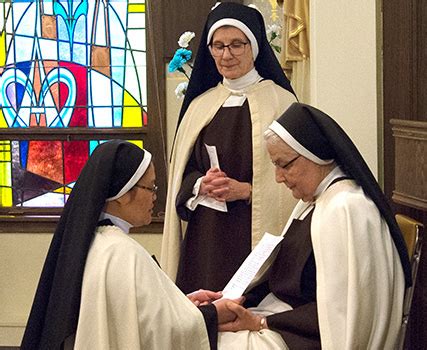One afternoon my family had the pleasure of serving dinner in our home to two friars from the Carmelite monastery of Mount Carmel in Wyoming. (Check out what they are doing over here at their website.) One of the things that still stays with me about the visit was the topic of the evangelical counsels. The evangelical counsels are vows that religious make in their desire to become “perfect”. The counsels are three: chastity, poverty, and obedience. These counsels are not binding upon all Christians, but are works that are more than what duty requires. Religious make a public profession of these counsels in the way of vows before the recognized authority in the Church which then recognizes them as members of the consecrated life. One of the Carmelite friars that afternoon referred to these counsels as: obedience, chastity and poverty. He said that obedience was most important, which is why he referred to them in that order listing obedience first. According to Rev Reginald Garrigou-Lagrange O. P., “Obedience is the highest of the three evangelical counsels, just as the pride of life is in itself a graver disorder than the concupiscence of the flesh.” (The Three Ages of the Interior Life)
For Secular Carmelites the desire for holiness brings us to make promises to tend toward evangelical perfection. The practice of the three evangelical counsels makes faith grow as well as hope and charity. The promise of obedience, for Seculars, is an exercise of faith. To obey is to do what pleases God. Obedience frees one of all self will and of one’s own judgment. Obedience particularly applies to the duties of the present moment. As a lay person, Secular Carmelites “search for God’s will in the events and challenges in society and in one’s own personal life”. In the context of the Secular Carmelite vocation, members cooperate with those leading the OCDS community and the Carmelite Order.
The promise of obedience is a pledge to live open to the will of God, “in whom we live and move and have our being” (Ac 17:28) imitating Christ who accepted the Father’s will and was “obedient unto death, death on a cross” (Ph 2:8). The promise of obedience is an exercise of faith leading to the search for God’s will in the events and challenges in society and our own personal life. For this reason the Secular Carmelite freely cooperates with those who have responsibility for guiding the community and the Order in discerning and accepting God’s ways: the community’s council, the Provincial and the General. [Const. #15]
To know God’s will begins by being open to it. God makes His will known in His revealed Word, through scripture, throughout the events of the day, and through those in authority. Those who “hunger and thirst for righteousness” (Mt 5:6) will then value any occasion that manifests in daily life to do the will of God even in the “little things” – which make up the majority of each day. Small acts of self-will are not acts of love for God; however, these do not break our friendship with God or separate us from His grace. The promise that Secular Carmelites make provides the grace – that is the state of mind and willingness – to obey. The more willingness there is the more grace is given.
Related to obedience is the virtue of justice. As an act of submission one submits to the will of another (a lawful superior) since they represent God. We must obey God through His the commandments. After all we are creatures. He is the creator and obviously superior! We have free will – a gift we have received from God. A good way to acknowledge this gift is by freely submitting our will to God, the Creator and giver of the gift. As His children we should obey just like Jesus did. Imitating Christ’s obedience who “humbled himself, becoming obedient to death, even death on a cross.” (Phil 2: 8) Obedience applies also to any promises made and especially to vows (like marriage vows).
Have the mind of Christ Have among yourselves the same attitude that is also yours in Christ Jesus, Who, though he was in the form of God, did not regard equality with God something to be grasped. Rather, he emptied himself, taking the form of a slave, coming in human likeness; and found human in appearance,” (Ph 2: 5-7)
The will of God includes the Commandments, Church and civil law, as well as the natural law. We should also be willing to submit to the Precepts of the Church. We can show our obedience to Christ’s counsels by performance of good works according to our state in life. The performance of duties related to our state in life should take precedence. Obedience should also be given to the inspirations of grace – when clear and submitted to a spiritual director, least we be under illusion. Generally inspirations of grace will be customary things undertaken according to our state in life and that do not trouble the soul. If this is the case, then we may do them without hesitation or under the guidance of a spiritual director. When we discern God has spoken, sometimes we need confirmation and we should seek it. If we believe that we have had a communication from God, we need to have it confirmed through others in the Church. St. John of the Cross says that, “God is so pleased that the rule and direction of humans be through other humans and that a person be governed by natural reason that he definitely does not want us to restore entire credence on his supernatural communications, or be confirmed in their strength and security, until they pass through this human channel of the mouth of another human person.” (The Ascent of Mount Carmel, 2:22,9) Extraordinary undertakings need to be done with a spiritual director’s advising. If it is from God He will make it known and confirmed in His own way and time. With this confirmation one can be assured that there is not any danger of self deception or illusion.
The Constitutions and Rules of Life (for religious) are also to be obeyed. In this case obedience is to be given to the superiors with and within the limits of the rule, obeying promptly and with generosity. St. John of the Cross in his Sayings of Light and Love (#13) explains that, “God desires the least degree of obedience and submissiveness more than all those services you think of rendering him.”(#13)
Obedience to those in authority can be challenging to our ego. Recalling that all authority comes from God, we should obey others over us out of reverence for God. Therefore, the wishes of those who govern us and make laws, police officers, teachers, and our bosses in our places of employment should be obeyed. Obeying them is obeying God. We should obey only those things that do not go contrary to the law of God. Additionally, we should obey not only when being watched, so as to get on the good side of the superior, but doing so willingly to serve Christ and from the heart.
“Slaves, be obedient to your human masters with fear and trembling, in sincerity of heart, as to Christ” (Ep 6: 5-9).
The Church representatives guide us – this is how God wants things to be done. Direction from our priest and bishops—this is how God speaks to us through others for our Lord said, “Whoever listens to you listens to me. Whoever rejects you rejects me. And whoever rejects me rejects the one who sent me.” (Lk 10:16) Sometimes “we cling greatly to our own will” and “hold to our own way of doing good more than to the good itself” (Rev Reginald Garrigou-Lagrange O. P. – The Three Ages of the Interior Life)
As a disciple we should be ready to listen for the Holy Spirit to prompt us and speak to us through others. God willed that we live in society because we are not self sufficient for all our needs. We need others. With our Secular Carmelite communities we are organized with leadership and the rules of our Constitutions and Statutes approved by the Church in order to come together for a common purpose. To carry this purpose out, we need rules and decisions in the various situations that the group meets. Our obedience only needs be in accordance with and within the limits of the present Rule (Constitutions). Someone needs to coordinate all those in the community towards the common good. Some command – some obey. Without obedience there would be chaos.
Even Jesus was subject to Mary and Joseph. “He went down with them and came to Nazareth, and was obedient to them” (Lk 2: 51) Submitting our will even in things that are hard, difficult or go against our own preferences is not easy. Doing so wholeheartedly, not complaining, with joy and perseveringly will have its rewards.
Obedience challenges us to be of the same mind as that of the superior or the one in charge. To do so means to conform our judgement and understanding (as well as our will) to that of another. Thus obedience expresses humility and puts to death (or mortifies) the self will. We all have self love and our own opinions that can derail us from obedience. St. Teresa in The Way of Perfections counsels: “Strive to obey, even if this may be more painful for you, since the greatest perfection lies in obedience.” (Way 39:3) She also relates this wise consolation in the prologue of The Interior Castle: “Obedience usually lessens the difficulty of things that seem impossible”.
The fruits of obedience will manifest in a correct way of behaving and thinking. It makes us wiser and, having the mind of God, we will think the way God does. Obedience also strengthens the will. However, God never commands the impossible, and He gives the strength to do what is difficult – like with the martyrs – He gives the grace needed. There comes a true freedom of spirit with obedience as St. Paul writes to the Romans – we will enjoy “the glorious freedom of the children of God.” (Rom 8:21) God’s truth and wisdom frees us from error and doubt. Those who do the Father’s will, will enter heaven. And as scripture reveals the humble “will be exalted” (Lk 14:11) Most importantly obedience “prepares for the contemplation of divine things”. (Rev Reginald Garrigou-Lagrange O. P. – The Three Ages of the Interior Life)
The object of obedience is the will; be willing to want to even know the will of God. The precept is expressed by the will of another. The motive or intention of obedience is to please God. The more we become interiorly responsive to doing the will of God, the more obedient we are. God’s will is manifested in many ways and circumstances especially through those in authority over us. Since the word obey comes from the Latin root which means “to be open” “to hear” – we should strive to have the ear of a disciple so as to hear God’s voice – this is obedience.



